|
|
|
Sort Order |
|
|
|
Items / Page
|
|
|
|
|
|
|
| Srl | Item |
| 1 |
ID:
139239
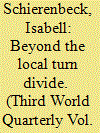

|
|
|
|
|
| Summary/Abstract |
This article builds on the contributions to this special issue by examining different approaches to the local turn and what can be learnt from applying them. The contributors agree on the imperative of understanding ‘the local’ in peacebuilding; however, there seems to be a multitude of ways forward in this regard. The immediate concern is how this acknowledgement translates into practices that allow for both efficiency and local emancipation in the building of peace. The article suggests giving up the ‘one-size-fits-all’ model of peacebuilding and engaging in context-based methods and research designs beyond generalisations. One way to go about this is to strive for interdisciplinary research – combining peace studies and political science with social anthropologists and area studies – but also to involve ‘the locals’ themselves in the process of taking a few methodological steps further.
|
|
|
|
|
|
|
|
|
|
|
|
|
|
|
|
| 2 |
ID:
139231
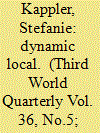

|
|
|
|
|
| Summary/Abstract |
This article challenges the notion of the ‘local’ as a static identity or set position and argues for a processual understanding of localisation, in which constant processes of delocalisation and (re-)localisation serve as tools by which peacebuilding actors position themselves in the political economy and the social landscape of peacebuilding. Peacebuilding agency and -identity are viewed as situated in time and space and subject to constant transformation. Using the cases of Bosnia-Herzegovina and Cyprus, I argue that the positionality of local identity is contingent on the ever-changing social context and political economy of peacebuilding. By viewing processes of (re-)localisation and delocalisation as markers of agency, we can overcome the binary between local and international and investigate more subtle forms of agency in a fluid peacebuilding environment. The article identifies the ways in which peacebuilding agency facilitates the creation of a particular set of identities (identification), before investigating the processes of delocalisation and (re-)localisation in detail. The article goes on to argue that, rather than being mutually exclusive, these two processes tend to happen in parallel and thus challenge the seemingly neat binary between local and international peacebuilding identities.
|
|
|
|
|
|
|
|
|
|
|
|
|
|
|
|
| 3 |
ID:
139228
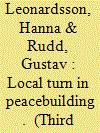

|
|
|
|
|
| Summary/Abstract |
This article is a literature review of the current local turn in peacebuilding. After a short introduction on the origins of ‘the local’ in peacebuilding, it gives an overview of current research and policy debates on the issue along two different lines. First, it emphasises the local in peacebuilding as a measure to increase peacebuilding effectiveness, as explored in the literature on the benefits of decentralisation and local governments for peace, as well as in the debates on local capacity and ownership as essential parts of peacebuilding policy. Second, it focuses on the local in peacebuilding as a means of emancipation and inclusion of local agency, expressed partly through the emphasis on voices from below and partly within the critical approaches to how the local has been interpreted in peacebuilding so far, arguing for a peacebuilding that is essentially local.
|
|
|
|
|
|
|
|
|
|
|
|
|
|
|
|
| 4 |
ID:
139234
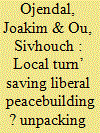

|
|
|
|
|
| Summary/Abstract |
The trajectory of the liberal peacebuilding project has encountered a fundamental critique of its failure to deliver the expected sustainable peace. This paper questions the approach with which it has been, and largely still is, pursued. We reflect on a more communicative, nuanced, contextual and time-bound approach. In particular, we identify the failure of the liberal peace to localise peace and to make it a part of everyday life in Cambodia. Nevertheless, we claim that liberal peace has unintentionally created space for progress, while a ‘local turn’ has proved significant. We demonstrate empirically that certain forms of local and everyday peace have emerged for the ‘wrong’ reason, and may evolve further. Hence, a local peace has gradually sunk in, although its liberal foundations remain virtual.
|
|
|
|
|
|
|
|
|
|
|
|
|
|
|
|
| 5 |
ID:
139236
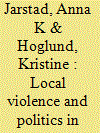

|
|
|
|
|
| Summary/Abstract |
This article analyses the narratives of survivors of violence in KwaZulu-Natal, South Africa, and addresses the relationship between local violence, politics and agency in a post-conflict setting. In particular, the study advances an understanding of how local political violence serves to increase or decrease agency. In line with previous research on emotions and agency, our study suggests that fear and anxiety encourage risk avoidance and have a pacifying effect on survivors of violence. It also indicates that anger and enthusiasm are emotions experienced by those who have a strong sense of agency and have become politically mobilised after violence. The study contributes to the debate on local capacity for peacebuilding and democracy by showing how local agency is affected by violence and how survivors of violence can become agents of change through politics.
|
|
|
|
|
|
|
|
|
|
|
|
|
|
|
|
| 6 |
ID:
139235
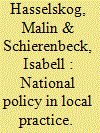

|
|
|
|
|
| Summary/Abstract |
Far reaching decentralisation reform has been launched in Rwanda, intended to contribute to socioeconomic development as well as to reconstruction and reconciliation. While the reform is well in line with the international trend of a ‘local turn’, the Rwandan government makes a point of not letting donors or other external actors set the agenda. Determined to formulate its own policies, thus claiming ‘national ownership’, it has, within the frame of decentralisation, launched several development programmes to be locally implemented and to promote local participation and downward accountability. However, the reform and programmes are designed and decided upon in a top-down manner by the central national leadership. This article analyses local experiences and perceptions of decentralisation and related programmes, and investigates whether and how such reform provides for local participation and downward accountability. It concludes that nationally owned reform is not necessarily an alternative to externally initiated and driven reform; neither local participation nor downward accountability was enhanced. The study builds on official policy documents and semi-structured interviews with Rwandan residents and local officials.
|
|
|
|
|
|
|
|
|
|
|
|
|
|
|
|
| 7 |
ID:
139232


|
|
|
|
|
| Summary/Abstract |
With Palestine gaining increasing international recognition for its sovereignty aspirations, this paper investigates the ongoing Palestinian state-formation process. It examines how far grassroots movements, domestic political leaderships and international actors have promoted or undermined intra-Palestinian unity and societal consensus around the rules, design and extent of a future Palestinian state. The paper introduces the novel concept of everyday state formation as a crucial form of grassroots agency in this process. Moreover, it illustrates the internal tensions of contemporary statebuilding: without reconciliation across multiple scales – local to global – the complex interactions of structural, governmental and subaltern power tend to build societal fragility into emerging state structures.
|
|
|
|
|
|
|
|
|
|
|
|
|
|
|
|
| 8 |
ID:
139233
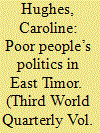

|
|
|
|
|
| Summary/Abstract |
Poor people attempting to claim a share of resources in post-conflict societies seek allies internationally and nationally in attempts to empower their campaigns. In so doing, they mobilise the languages of liberalism, nationalism and local cultural tradition selectively and opportunistically both to justify stances that transgress the strictures of local culture and to cement alliances with more powerful actors. In the case of poor widows in East Timor the languages of nationalism, ritual and justice were intermingled in a campaign aimed at both international actors and the national state in a bid to claim a position of status in the post-conflict order.
|
|
|
|
|
|
|
|
|
|
|
|
|
|
|
|
| 9 |
ID:
139237


|
|
|
|
|
| Summary/Abstract |
Improving state–citizen relations at the local level is posited as one of the pathways out of fragility towards peace and stability. This article explores this premise by examining the experience of a recent donor-funded project in Guinea that combined improvements in sectoral service delivery with new modes of collaborative governance between local officials and communities. The analysis finds that the project’s focus on citizen engagement with local officials, coupled with transparency and mutual accountability, led to better services, changed attitudes and increased trust. Individual agency and leadership emerged as important success factors. Prospects for sustainability of these local reforms are challenged by Guinea’s weak state capacities and poverty. Lessons for donors include supporting stability-enhancing governance through incremental interventions that create relationships and coalitions among local actors.
|
|
|
|
|
|
|
|
|
|
|
|
|
|
|
|
| 10 |
ID:
139238
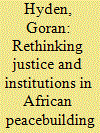

|
|
|
|
|
| Summary/Abstract |
This article argues that conflicts in Africa need to be understood in the context of local conceptions of justice, which differ from those of the liberal peace model. Justice in African society is based on the notion of reciprocity which, when practised, tends to lead to solutions that resemble prisoner dilemma games. Because agreements are more like truces than true peace agreements they are easily abandoned when the costs of adhering are higher. Bringing in these local conceptions are vital for peacebuilding in Africa but so is the need to reform them so that they become more sustainable.
|
|
|
|
|
|
|
|
|
|
|
|
|
|
|
|
| 11 |
ID:
139227
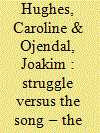

|
|
|
|
|
| Summary/Abstract |
This introduction presents how views on ‘the local turn’ in peacebuilding has evolved into a significant discourse. Currently, it has ‘its moment’ and is widely used by theorists and practitioners alike, by normative localists as well as by liberal policy-makers, albeit for different reasons and with differing intensions. We suggest that international interventions for the purpose of peacebuilding cannot be justified a priori, but requires resonance at the ‘receiving end’, which the local dimension potentially offers. It is however an elusive and contested concept that requires thorough scrutiny and critical assessment. Here a collection of conceptual and empirical articles is contextualised and introduced, painting a broad state-of-the-art of the pros and cons of the local turn.
|
|
|
|
|
|
|
|
|
|
|
|
|
|
|
|
| 12 |
ID:
139230
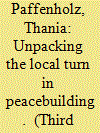

|
|
|
|
|
| Summary/Abstract |
This article undertakes a critical assessment of the local turn in critical peacebuilding scholarship. It comes to the conclusion that the local turn is hampered by a binary and essentialist understanding of the local and the international, which are presented as the only relevant locations of power or resistance. This leads to an ignorance of local elites, provides a romanticised interpretation of hybrid peace governance structures, overstates local resistance and presents an ambivalent relationship to practice. The article recommends a more nuanced understanding of the actors involved in peace- and statebuilding, based on more empirical scholarship and a multidisciplinary approach.
|
|
|
|
|
|
|
|
|
|
|
|
|
|
|
|
| 13 |
ID:
139229
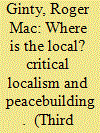

|
|
|
|
|
| Summary/Abstract |
This article is primarily a piece of conceptual scoping and considers the concept of ‘the local’ in relation to peacebuilding. It notes how the local is simultaneously held to blame for conflicts (as unenlightened, dangerous, uncivilised) and is also regarded as a saviour for international peace support operations. Local legitimacy, partnership and ownership of international peace interventions are seen as a fast track to success, sustainability and exit. The article navigates its way around this confused understanding of the local and argues that the local is a (not always helpful) construction. It further argues that, by applying a critical lens towards the concept of the local, we can seek to separate the concept of the local from territory and see it in terms of activity, networks and relationships. This has implications for practice and ‘field’ work.
|
|
|
|
|
|
|
|
|
|
|
|
|
|
|
|
|
|
|
|
|